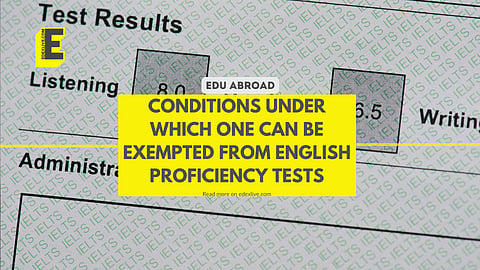Waivers for English proficiency tests: Here's when universities waive it off
What if we say there might be a slight chance that you don’t need to attempt English proficiency tests at all? Here’s when this might be possible
- If the international student belongs to one of the following countries like the USA, the UK, Australia, Canada, New Zealand, Singapore, Ireland and so on, where English is a native language, one can avail a waiver
- One can still request a waiver if they have completed an undergraduate or graduate degree in the UK, the USA, Australia, Canada and so on, provided the courses were taught in English
- A few universities also accept waivers from students who have completed a part of their education in a native English-speaking country and have secured a certain minimum Grade Point Average (GPA)
- If one has had full-time employment for a considerable period (usually over two years) in Australia, Canada, the UK, the USA and the like
- If one is a non-native English speaker, they would still have good reason to request a waiver if their official language of instruction was English. Also, all their official documentation needs to be in the English language and credibly authorised
- Many universities in the UK offer admission without IELTS for Indian students depending on their English language score of Class XII and sometimes the board as well
- A few universities only provide IELTS waivers for students from the Central Board of Secondary Education (CBSE)/the Indian Certificate of Secondary Education (ICSE) boards
- Many universities conduct their own Self English Language Test (SELT) to assess the candidate’s proficiency in English
- Universities in the UK sometimes offer pre-sessional courses for a duration of six to twelve weeks, in order to improve applicant’s IELTS scores
- Few universities arrange for online interviews if applicants don’t fulfil the conditions


